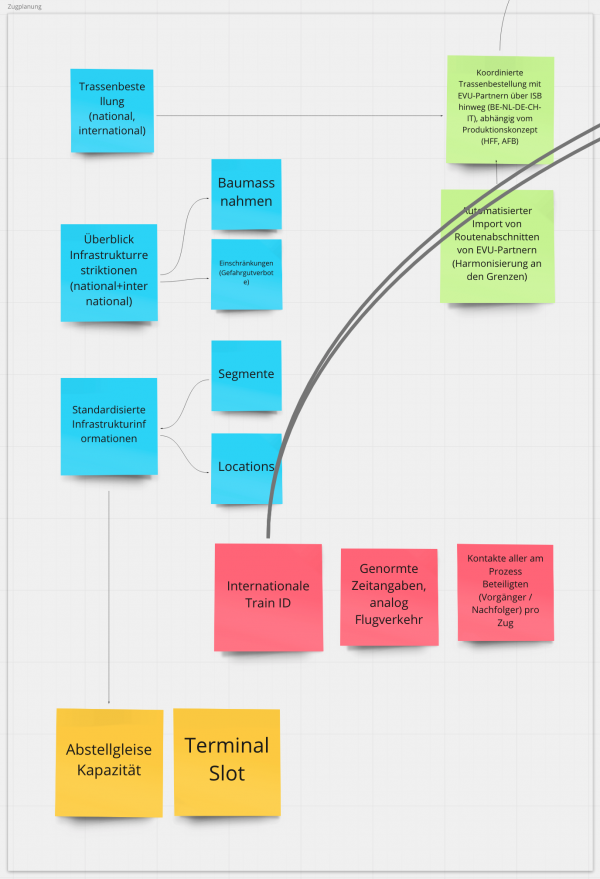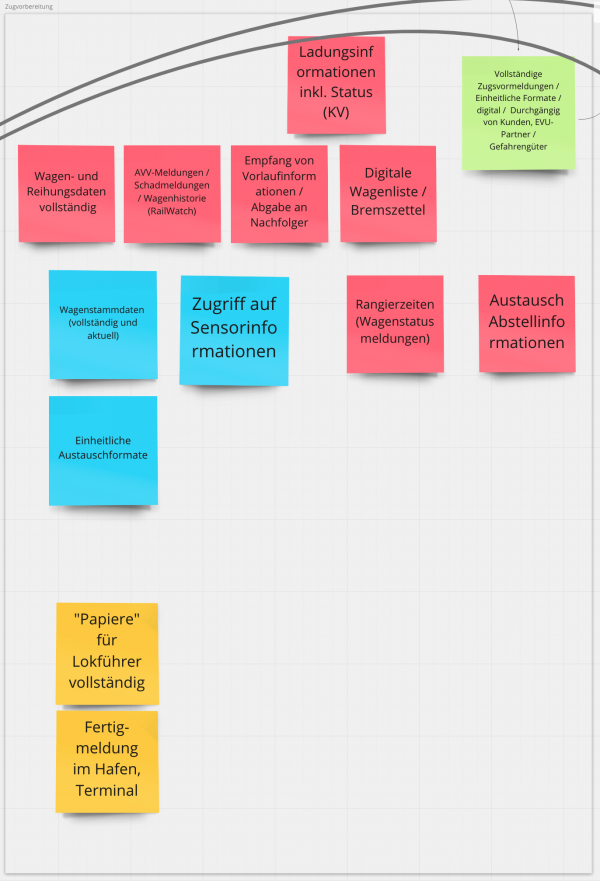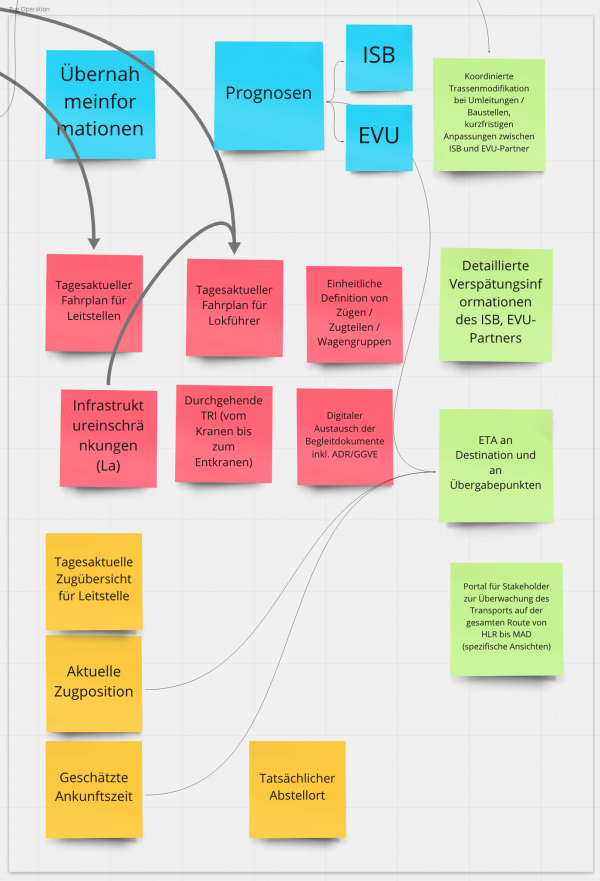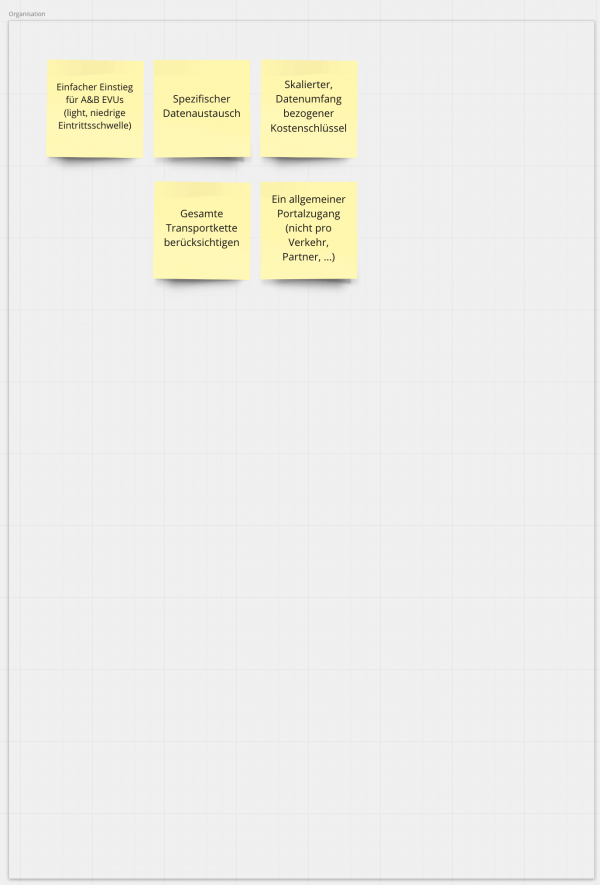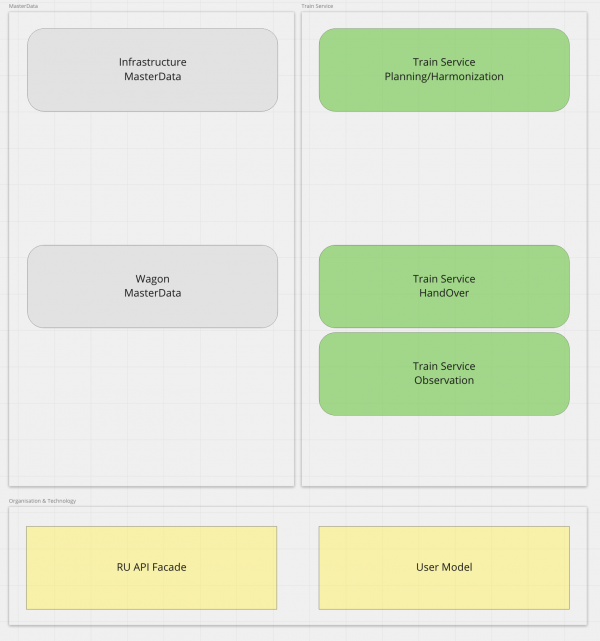DS DE1 GAP
Organisation
The GAP Session was held on 6.July 14:30 to 16:30 with four participants
- Pascal Truniger BLS Cargo AG
- Martin Schmidt SBB Cargo International AG
- Markus Bürkl WHE
- Wolfgang Schüttler CN Consult
The SOLution Session is planned for end of August
GAP
Train Planning phase
The raised topics can be grouped into the RFF services:
- Train Service Harmonization
- Trassenbestellung (national, international)
- Koordinierte Trassenbestellung mit EVU-Partnern über ISB hinweg (BE-NL-DE-CH-IT), abhängig vom Produktionskonzept (HFF, AFB)
- Automatisierter Import von Routenabschnitten von EVU-Partnern (Harmonisierung an den Grenzen)
- Internationale Train ID
- Genormte Zeitangaben, analog Flugverkehr
- Kontakte aller am Prozess Beteiligten (Vorgänger / Nachfolger) pro Zug
- Terminal Slot
- Infrastructure masterdata
- CAP01 GEO: locations and segments
- Restrictions (CAPA XX)
- Standardisierte Infrastrukturinformationen: Locations und Segmente
- Überblick Infrastrukturrestriktionen (national+international): Baumassnahemn und Einschränkungen
- Abstellgleise Kapazität
Train Preparation phase
In the Preparation phase the raised topics are grouped to:
- Train Handover
- Ladungsinformationen inkl. Status (KV)
- Vollständige Zugsvormeldungen / Einheitliche Formate / digital / Durchgängig von Kunden, EVU-Partner / Gefahrengüter
- Wagen- und Reihungsdaten vollständig
- Empfang von Vorlaufinformationen / Abgabe an Nachfolger
- Digitale Wagenliste / Bremszettel
- Rangierzeiten (Wagenstatusmeldungen)
- Austausch Abstellinformationen
- Einheitliche Austauschformate
- Fertigmeldung im Hafen, Terminal
- "Papiere" für Lokführer vollständig
- Wagon masterdata
- AVV-Meldungen / Schadmeldungen / Wagenhistorie (RailWatch)
- Wagenstammdaten (vollständig und aktuell)
- Zugriff auf Sensorinformationen
Train Operation phase
The operational topics relate to the RFF services:
- Train Service Harmonization
- Tagesaktueller Fahrplan für Leitstellen
- Tagesaktueller Fahrplan für Lokführer
- Tagesaktuelle Zugübersicht für Leitstelle
- Einheitliche Definition von Zügen / Zugteilen / Wagengruppen
- Train Handover
- Übernahmeinformationen
- Digitaler Austausch der Begleitdokumente inkl. ADR/GGVE
- Tatsächlicher Abstellort
- Train Running Information
- Prognosen vom IM und EVU
- Detaillierte Verspätungsinformationen des ISB, EVU-Partners
- Durchgehende TRI (vom Kranen bis zum Entkranen)
- Portal für Stakeholder zur Überwachung des Transports auf der gesamten Route von HLR bis MAD (spezifische Ansichten)
- Aktuelle Zugposition
- Geschätzte Ankunftszeit
- ETA an Destination und an Übergabepunkten
- Infrastructure masterdata
- Infrastruktureinschränkungen (La)
Organisational Issues
In the round the need for
- an easy technical access and
- a light user model
are prerequisites to participate in the digital data exchange.
English Summary
In the first German speaking GAP Discovers session the four participants raised the above noted issues. To summerize those topics they can be grouped under the following services. The following up SOLution Discovery Session to discusss in plenum possible solutions will be held at the end of August.
Infrastructure masterdata
- Reliable and uptodate information about nodes and segments (CAP01 GEO)
- Infrastructure restrictions: Network segment and node restrictions caused my planned/unplanned maintenance and incidents.
- Local information about nodes capacities and facilities
Wagon masterdata
- GCU messages concenring WagonDamage and WagonRepairHistory (RailWatch)
- Complete and uptodate technical wagon masterdata
- Access to sensor information on the wagon
Train Service planning
- Common understanding about train and its "components" (train, trainpart, wagongroup)
- Common train service planning (technical characteristics and timetable)
- Open information about train service plannning status
- International Train ID
- Standardized time information as in air traffic
- Contact information about all involved parties
- Planned terminal slot
- Aligned path request with RU partners across Infrstructure network borders (BE-NL-DE-CH-IT) depending on the role (contract holder, carrier)
- International and national Path request
- Automated import of neighbouring path segments for a common train service (Harmonisation at handover and interchange points)
- Operational timetable for operation centers
- Operational timetable for loco driver
- Accurate operational train information
Train Service HandOver
- Goods information including status (Combined Traffic)
- Complete, ontime train preadvice messages
- digital, standard format,
- throughgoing from customer and RU partner,
- dangerous goods
- Provisionig of omplete wagonlist
- digital
- Reception of status and forecast messages from previous partner
- Delivery of status and forecast messages to next partner in row
- Provisioning of Brakesheet
- digital
- Wagon status messages about shunting, delivery, provisioning
- Provisioning of parked units, wagons
- planned
- operational (real location)
- Provisioning of TrainReady messages from Port and Terminal operators
- Complete informationset for loco driver
- Handover information
- Digital exchange of train accompaning documentents incl ADR/GGVE
Train Service Monitoring
Train Running Information
- Accurate train forecast messages provided by IM
- Detailed delay information from IM and RU partner
- Throughgoing train running information (from slot to slot)
- Centralized portal for interested parties to monitor the transport along the whole route from HLR to MAD (with specific perspectives)
- Accurate train location
- Estimated time of arrival at
- HandOver points
- Interchange points and
- Destination
Technical and organisational issues
In the round the need for
- an easy technical access and
- a suitable (light) user model
are prerequisites to participate in the digital data exchange.
